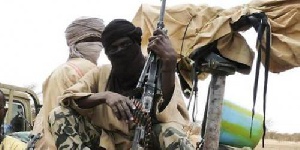 Boko Haram militants. File photo.
Boko Haram militants. File photo.
The struggle against the evil extremist Boko Haram terrorists in Nigeria suffered a terrible setback last week with the matyrdom of Lt Col Abu Ali. The fallen Colonel was described as a fearless and gallant officer who together with his team recaptured several towns and villages from the extremist Boko Haram terrorists. The sense of pessimism that has engulfed the masses after last week's incident is not only peculiar to the locals in the affected areas but also amongst some senior military officers who openly expressed this during the burial service for the officers.
This brings to the fore the issue of commitment and willingness by the International community to the fight against violent extremism in Sub Saharan Africa. The Boko Haram menace has ceased to being a local or regional problem to being one with International ramifications since they (Boko Haram) pledged allegiance to ISIS which is a recognized global threat.
Contrary to expectation, the International community appears to have abandoned this responsiblity of collectively fighting to exterminate this evil Boko Haram group and its harms on the society. The World super powers have, instead, concentrated all their arsenals to fighting a proxy war, whose end is not in near sight, in Syria. Each of the super powers takes full responsibilty in partaking physically in the war as well as supplying their proxy factions with all the necessary millitary logistics.
Can we imagine what the status quo of the war against Boko Haram would be if the Nigerian army had received a fraction of the logistics and support given to the differing factions in Syria? I dare say the war would have been over by now. The battle in Nigeria is much more defined than in Syria or Iraq. The battle lines are clearly drawn with little fears for civilian casualties. With a fraction of the Air Support logistics and ground forces given to each of the factions in Syria, the Boko Haram menace would have been over.
However, the super powers who describe themselves as 'World Police' look unconcerned or in their show of generosity give a paltry amount of assistance which cannot not cause a significant effect. They spend their resources fighting a proxy war with much more civilian casualties daily and no clearly defined lines and no end in sight to the expense of a war that can be easily won. This is how they have always reacted to situations in Sub-Saharan Africa only to come later after the damage has been done to provide so-called humanitarian aid.
This is a serious problem and it is time the African Union and/or West African countries pull resources together to support Nigeria in this all important battle because the consequence of lack of immediate action is more of an International nature than local and devastating.
Dr. Issah Imoro
(issahwuni@gmail.com)